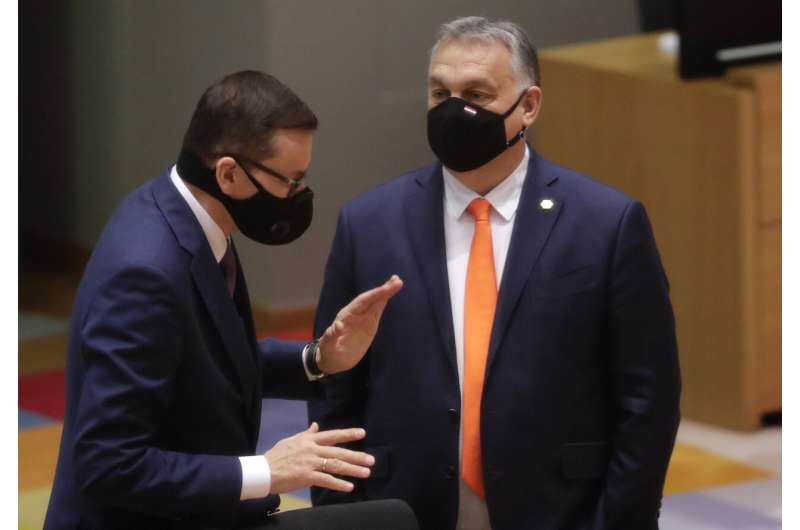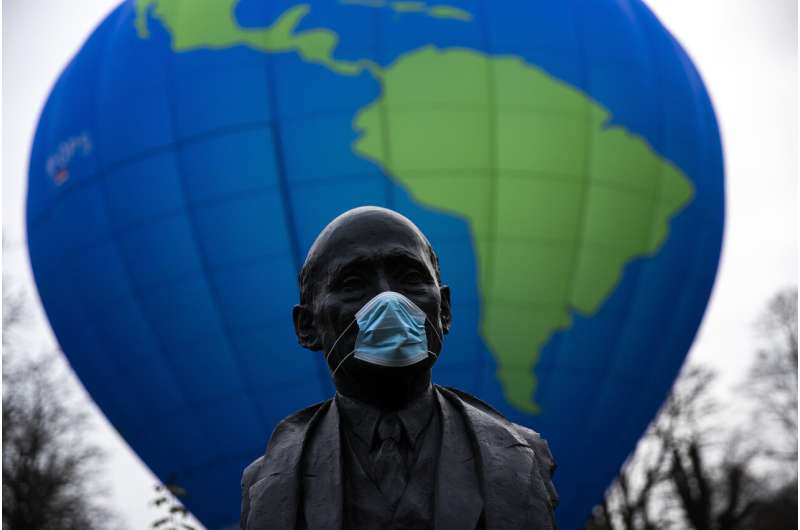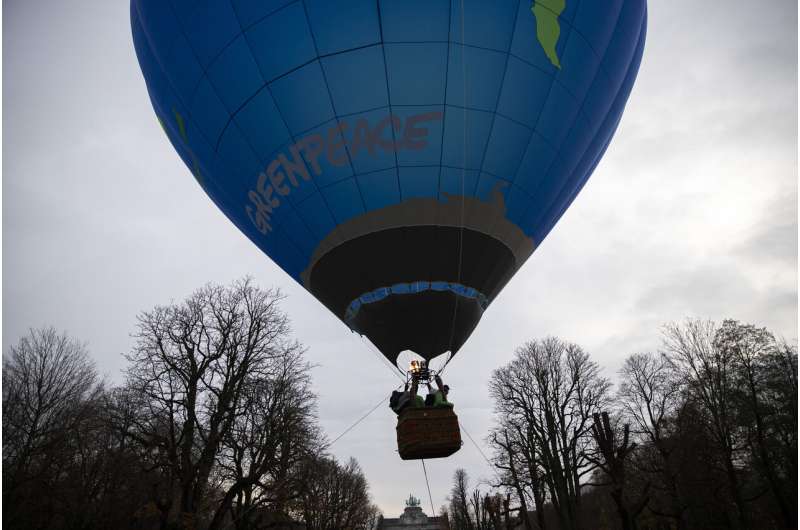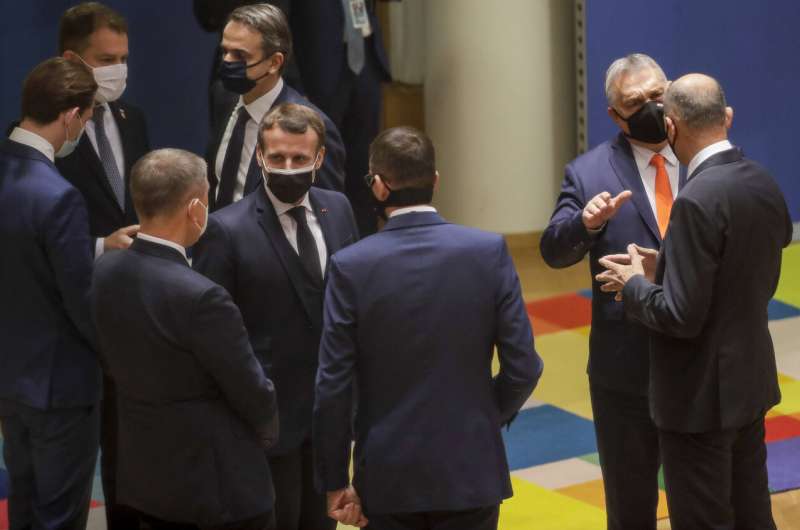Poland's Prime Minister Mateusz Morawiecki, left, speaks with Hungary's Prime Minister Viktor Orban during a round table meeting at an EU summit at the European Council building in Brussels, Thursday, Dec. 10, 2020. European Union leaders meet for a year-end summit that will address anything from climate, sanctions against Turkey to budget and virus recovery plans. Brexit will be discussed on the sidelines. (Olivier Hoslet, Pool via AP)
EU leaders on Friday agreed an ambitious target for cutting greenhouse gas emissions after unlocking the bloc's landmark budget and coronavirus recovery fund at a marathon summit.
The 27 member states struck a deal on a binding target to slash emissions by at least 55 percent by 2030 following an entire night of intense wrangling in Brussels.
The fight was over how the cost of the effort should be shared across the countries: highly dependent on coal, Poland—allied with several Eastern European countries—fears serious economic consequences and demanded details on the aid it would receive.
French President Emmanuel Macron tweeted an appeal for action after the target was agreed, insisting: "Let's do everything to succeed. Now. All together. Because there is no plan B!"
As part of its commitments to the Paris Climate Agreement, the EU has pledged to become climate-neutral by 2050, the date when it would offset or capture more greenhouse gas than it emits.
However, the current interim target for 2030—a 40 percent reduction in CO2 emissions compared to 1990—is not now seen as sufficient to achieve this goal.
At an October summit, the EU leaders postponed the decision on the more ambitious climate target until their next meeting, given the hesitation by the eastern member states.
The bust of French statesman Robert Schuman, one of the founders of the European Union, is seen while environmental activists launch a hot air balloon during a demonstration outside of an EU summit in Brussels, Thursday, Dec. 10, 2020. European Union leaders meet for a year-end summit that will address anything from climate, sanctions against Turkey to budget and virus recovery plans. Brexit will be discussed on the sidelines. (AP Photo/Francisco Seco)
Green new deal
The new climate goals are backed by big EU powers, including France and Germany, as well as many major businesses keen to access European funding to kickstart a recovery through what Brussels has taken to calling a green new deal.
But environmental activists decried the latest move as not ambitious enough.
"It shows that political convenience takes precedence over climate science, and that most politicians are still afraid to take on big polluters," Greenpeace EU climate policy adviser Sebastian Mang said.
The marathon row over climate targets began after the resolution of another fight, also involving Warsaw, that might have spurred optimism.
The leaders resolved a bitter dispute with Poland and Hungary and salvaged the bloc's landmark coronavirus recovery plan that the countries had vetoed.
Europe's 1.8-trillion-euro ($2.1-trillion) budget and coronavirus recovery package had been blocked by Hungary and Poland over an attempt to link the disbursement of funds to respect for the rule of law.
Environmental activists launch a hot air balloon during a demonstration outside of an EU summit in Brussels, Thursday, Dec. 10, 2020. European Union leaders meet for a year-end summit that will address anything from climate, sanctions against Turkey to budget and virus recovery plans. Brexit will be discussed on the sidelines. (AP Photo/Francisco Seco)
The stand-off risked delaying the recovery fund well into next year, just as a second wave of the coronavirus pandemic was punishing the European economy, but on Thursday the leaders came to a compromise that allowed the package to go through.
"Today's agreement shows that insight triumphs over egoism. With this financial package, Europe can emerge powerfully from the crisis," German finance minister Olaf Scholz said in a statement.
"We have defended the interests of Hungary. D-Day was a success!" Hungarian Prime Minister Viktor Orban said.
Brexit pushed aside
And his Polish counterpart Mateusz Morawiecki said: "We fight for our rights. We fight for clarity, we fight for certainty of law, and we fight for the EU treaty so that they are not circumvented by the secondary law."
Under the deal, the Polish leader explained, the rule of law mechanism would be limited to ensure that EU funds are spent correctly according to precise criteria and not touch on social issues such as abortion, LGBT rights or migration policy.
Budapest and Warsaw are major recipients of EU budget cash, and their critics see the rule of law mechanism as a way to slow their alleged slide into authoritarianism.
French President Emmanuel Macron, center, speaks with Czech Republic's Prime Minister Andrej Babis, third left, and Poland's Prime Minister Mateusz Morawiecki, center right, during a round table meeting at an EU summit at the European Council building in Brussels, Thursday, Dec. 10, 2020. European Union leaders meet for a year-end summit that will address anything from climate, sanctions against Turkey to budget and virus recovery plans. Brexit will be discussed on the sidelines. (Olivier Hoslet, Pool via AP)
Both governments have been accused by Brussels of rolling back democratic freedoms, notably judicial independence in Poland and press and civil society freedoms in Hungary.
The climate and the budget succeeded in pushing failing Brexit trade negotiations to the side.
EU chief Ursula von der Leyen told leaders that there were "low expectations" of a deal in a short discussion at the end of the summit.
London and Brussels have said they will decide by Sunday whether to press on with talks aimed at reaching an accord or throw in the towel, as negotiators from the two sides met again to seek a way forward.
Amid their packed schedule the EU leaders also agreed to draw up a list of Turkish targets for sanctions in response to Ankara's prospecting for gas in Greek and Cypriot waters.
The move fell short of broader punitive measures urged by Athens and Nicosia, as other EU nations remained hesitant about imposing wider sanctions or an arms embargo on NATO member Ankara.
© 2020 AFP



























